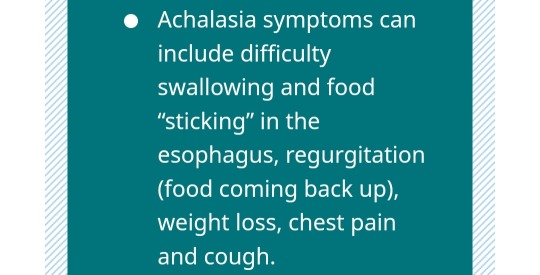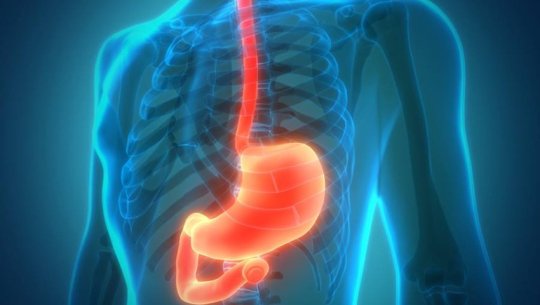#Achalasia
Explore tagged Tumblr posts
Text
WTF I JUST FOUND OUT CARL SAGAN HAD THE SAME RARE DISEASE I HAVE
6 notes
·
View notes
Text
What to Expect from POEM Surgery for Achalasia
#achalasia#achalasia cardia#achalasia definition#achalasia icd 10#achalasia meaning#achalasia medical procedure#achalasia medication#achalasia of cardia#achalasia of esophagus#achalasia surgery#achalasia symptoms#achalasia treatment#achalasia treatments#achalasia types#cricopharyngeal achalasia#esophageal achalasia#how i cured my achalasia#poem achalasia#type 2 achalasia#what is achalasia
0 notes
Text
did a lil research on manometry and what certain disorders look at during the testing and 🙃 looks like i have achalasia

that trackkkkks lmfao 🫠
#chronic illness tag#one way it's treated is dilation but with my eds that sounds like a horrible idea lol#achalasia#(we shall see)#dysphagia#global gi dysmotility#gi dysmotility#gastroparesis#neurogenic bowel#intestinal dysmotility#love to have several major organs start shutting down before the rips age of 28 lol having a blast :)
0 notes
Text
Yes!!!
And furthermore, Dysphagia is often just a symptom or sign—the first one, even—of other conditions of the throat/esophagus.
It can also have a very slow progression (like months or years slow) that can seem to feel the same for a while before suddenly getting just a bit worse… again… and again… and again… over and over. So if you’re like me from a few years ago, and feel at this time like you’re “managing it” whenever your food sticks by, say:
Drinking water
Tilting your head back
Stretching
Getting up to walk around
…well, you might be managing it right now, but…
…managing is not the same as treatment, and untreated problems tend to get worse.
Since this problem is happening to a VERY IMPORTANT part of your body, it’s a very important problem to address. So PLEASE talk to your doctor about treating it.
Take it from someone who just got diagnosed with Achalasia this week, after years of dealing with swallowing problems which kept gradually worsening despite every attempted “management strategy”, diet change, and acid reflux treatment—you DON’T want to be like me and keep waiting around to get better treatment for an essential part of your body. It took me until the point of becoming underweight and stuck eating a miserably restrictive puréed-food diet to recognize how much I needed better treatment. It SUCKS to be at this point, so PLEASE take care of yourself so you don’t potentially end up in an equally sucky situation.
TLDR: If you can’t swallow food or drink normally, TALK TO YOUR DOCTOR ABOUT TREATING THAT. Swallowing is an important function of your body, essential to your health and survival—if you aren’t able to eat/drink properly, your whole body can suffer.
hello world!!!
I want to talk to you about swallowing (not in a sexual light)
swallowing is supposed to be:
efortless
automatic
painless
and should happen without conscious thought
choking is supposed to be infrequent
if that does not sound like your swallowing experience you are probably part of the 5-15% of the population that has dysphagia. if your swallowing is bothering you then you can (and should) bring up your concerns to a doctor
swallowing is not supposed to be difficult!
#physical disability#physically disabled#cripple punk#cripplepunk#chronic illness#chronically ill#dysphagia#disability#disabled#achalasia#Achalasia cardia#swallowing problems#swallowing issues#acid reflux#gastroesophageal reflux disease#gerd#stomach problems#stomach issues#esophagus issues#esophagus problems#heartburn#difficulty swallowing#difficulty eating#painful swallowing#trouble eating#trouble swallowing#trouble drinking#difficulty drinking#psa#health psa
933 notes
·
View notes
Text
For My Health
*Freeze frame* *Record scratch* The view from my hospital bed. Yup, that’s me. You’re probably wondering how I ended up in this situation. This is a failure of sorts. Not hereditary, so I can’t blame my family. No known cause or trigger, so no big regrets. I sleep with a wedge and have an eating schedule that rivals a Mogwai—no late-night snacks. No prevention, no cure—just a wonky lower…

View On WordPress
1 note
·
View note
Text
Struggling with swallowing, chest pain, or unexpected weight loss? It could be Achalasia—a rare disorder that affects the esophagus, making it difficult for food to reach your stomach. 🌱 Swipe through to learn more about the symptoms and why early diagnosis is key to relief. Don’t ignore the signs—your health matters!
.
.
.
Schedule a consultation: Dr. Hitendra K Garg
📲 8920361841, 8920632657
📲 Follow us: @drhitendragarg
Visit: www.drhitendrakgarg.com
.
#Gastroenterologist#drhitendragarg#bestgastroenterologistindelhi#apollohospitaldelhi#Achalasia#GutHealth#DigestiveHealth#HealthAwareness#SwallowingIssues#EsophagusHealth#DigestiveIssues#AchalasiaAwareness#SwallowingDisorders#GIHealth
0 notes
Text
I'm recovering form acute gastritis. I'm healing and so mucg in thirst. Waking up in the middle of night for nightly time quest for juices. So far i have finished in the span of 5 days a orange mango yoghurt, red syrup mixed with water, sarsi mixed with water, soya, watermelon, iced lemon tea, apple juice, and lots and lots of medium chilled water.
0 notes
Text
anyways my test result came back all normal :) my esophagus is normal :) i’m actually fine guys and i don’t throw up in my mouth 15 times a day :)!
#maybe it’s true and i just do have Insane gerd. i don’t know anymore. i thought for sure it was a motility issue#i guess i’m glad it seems like i don’t have. achalasia. but idk#she also said no hiatal hernia seen but i could’ve sworn after my endoscopy they said i had a small one ????? maybe it .. went away??????
6 notes
·
View notes
Text
Ano ang Aasahan mula sa POEM Surgery para sa Achalasia
#achalasia#achalasia cardia#achalasia definition#achalasia icd 10#achalasia meaning#achalasia medical procedure#achalasia medication#achalasia of cardia#achalasia of esophagus#achalasia surgery#achalasia symptoms#achalasia treatment#achalasia treatments#achalasia types#cricopharyngeal achalasia#esophageal achalasia#how i cured my achalasia#poem achalasia#type 2 achalasia#what is achalasia
0 notes
Text
got the results of my manometry yesterday btw. i have esophagogastric junction outflow obstruction (egjoo) which is a precursor to achalasia. i wasn't able to tolerate the test so its probably not fully accurate but hey at least theres a name for it even though its irritatingly long 💀
#haven't gotten any more answers#egjoo is sometimes treated with a gj tube apparently#variant of achalasia#other treatments are like. widening the junction but that sounds like a horrible idea w eda#eds*
4 notes
·
View notes
Text
*Record scratch*
*Freeze frame*

This is a failure of sorts. Not hereditary, so I can’t blame my family. No known cause or trigger, so no big regrets. I sleep with a wedge and have an eating schedule that rivals a Mogwai—no late-night snacks. No prevention, no cure—just a wonky lower esophageal sphincter (LES). Treatments? Scopes, balloons, Botox—you name it, I’ve tried it.
It’s called Esophageal Achalasia. No hashtags or TikTok challenges for this one. It’s rare, but not that rare—about 1 in 100,000. We're talking dying in a commercial plane crash or being born polydactyly…being struck by lightning twice or finding a five-leaf clover. Ok, maybe that is rare but not a one in a million type thing, so stay vigilant!
About 12 years ago, I noticed I was struggling with certain foods. I assumed it was diet-related. I also had this persistent cough, which I blamed on post-nasal drip. I tried an elimination diet—nothing changed. Visits to doctors didn’t reveal much at first. Eventually, an ENT ruled out ears and nose, and the gastro team stepped in. A barium swallow X-ray finally showed what was going on…and the bird’s beak looked like the picture on the Wikipedia page.

Fast forward to now. After years of managing this condition with copious amounts of water and will to eat, I decided it was time for long-term treatment. I just had a Heller Myotomy with Dor Fundoplication…a modernized 110-year-old procedure which puts the “fun” in acid reflux. There’s another option called a per-oral endoscopic myotomy (POEM for short) but it’s not available locally.

0 notes
Text
Are you or someone you know suffering from Achalasia? Discover the transformative benefits of POEM (Peroral Endoscopic Myotomy)! 🌟
✨ Why Choose POEM?
Enjoy a faster recovery and get back to your life sooner.
Experience less blood loss during the procedure.
Benefit from a minimally invasive technique.
Spend less time in the hospital with a shorter stay.
POEM is a safe procedure with a low risk of complications.
Feel less pain compared to other treatments.
Take control of your health and explore POEM for a smoother, quicker, and more comfortable journey to wellness. 💪
.
Schedule a consultation at Indraprastha Apollo Hospitals
Visit: www.drhitendrakgarg.com
For Consultation : Dr. Hitendra K Garg
📲 8920361841, 8920632657
#Gastroenterologist#drhitendragarg#bestgastroenterologistindelhi#apollohospitaldelhi#Achalasia#POEMProcedure#MinimallyInvasive#FasterRecovery#LessPain#HealthTips#MedicalAdvancements#HospitalStay#SafeProcedure#LessBloodLoss#WellnessJourney#MedicalInnovation#PatientCare#HealthAwareness#MedicalTreatment
0 notes
Text



𝓥𝓮𝓷𝓾𝓼 𝓓𖦹𖦹𝓶
#p0is0ngirlx#my posts#my photos#gif#gifs#edits#my edits#witchy#goth aesthetic#spooky#goth#alt#forest#full moon#90s baby#achalasia#scorpio moon#aquarius sun
7 notes
·
View notes
Text
Complete Care for Every Cancer Journey
Trusted Oncologists & Surgeons ELCE Clinics is a leading cancer hospital in Coimbatore, home to highly skilled cancer specialists who combine advanced medical knowledge with cutting-edge technologies to treat diverse cancer conditions.
Comprehensive Cancer Management From initial screening and accurate diagnosis to advanced surgeries, chemotherapy, and aftercare, we deliver all cancer services in one seamless and coordinated system.
Personalized & Compassionate Support We prioritize individualized care plans, emotional well-being, and consistent follow-up, ensuring every patient receives comfort, dignity, and strength throughout their treatment journey.
🔗 https://elceclinics.com/blog/tag/cancer-treatment-in-coimbatore/

#cancer colon treatment in coimbatore#achalasia cardia treatment#cancer intestine treatment in coimbatore#stomach cancer surgery#treatment for stomach cancer
0 notes
Text
An incisional hernia is a type of hernia that occurs at the site of a previous surgical incision. After abdominal surgery, the abdominal wall may weaken, allowing tissue or organs to push through and form a bulge.
0 notes
Text

Common Myths About Esophageal Manometry: Debunked!
Esophageal manometry is a key diagnostic test used to evaluate how well the muscles of the esophagus are functioning, especially when patients experience swallowing problems, heartburn, or other gastrointestinal symptoms. Despite its significance, several myths and misconceptions surround this procedure. Let’s take a closer look at some of these myths and debunk them with facts.
Myth 1: Esophageal Manometry is Painful:
Truth: Many patients worry that the test will be painful. In reality, esophageal manometry may cause mild discomfort or a gagging sensation when the catheter is inserted through the nose, but it is not painful. The discomfort usually subsides quickly, and the test lasts only about 30–45 minutes.
Myth 2: It's Only Done When You Have Severe Symptoms:
Truth: This test is not reserved only for severe symptoms. Even mild signs like frequent heartburn, unexplained chest pain, or trouble swallowing (dysphagia) could indicate esophageal motility diseases such as achalasia or esophageal spasm. Early diagnosis with manometry can help guide effective treatment and prevent complications.
Myth 3: Esophageal Manometry is Risky:
Truth: Esophageal manometry is a safe and minimally invasive process. Complications are extremely rare. Since it doesn’t involve any incisions, radiation, or sedation, the overall risk is very low when performed by trained professionals like those at Kaizen Gastro Care.
Myth 4: The Procedure Requires Hospital Admission:
Truth: Esophageal manometry is typically performed on an outpatient basis. You don’t need to be admitted to the hospital. Patients can usually resume normal activities shortly after the test unless instructed otherwise by their doctor.
Myth 5: It's Not Necessary If an Endoscopy Has Been Done:
Truth: Endoscopy and esophageal manometry serve different purposes. While endoscopy visualizes the structure of the esophagus, manometry measures the function and muscle coordination of the esophagus and lower esophageal sphincter. It’s especially important before anti-reflux surgery or if structural problems are not found on endoscopy.
Myth 6: Only Gastroenterologists Perform This Test:
Truth: While gastroenterologists may recommend the test, specialists in gastrophysiology, like myself, are trained specifically in esophageal motility testing. At Kaizen Gastro Care, we use high-resolution manometry (HRM) to provide accurate diagnosis and optimal patient comfort.
Myth 7: Manometry is Just a Fancy Test With No Real Use:
Truth: Far from it! Esophageal manometry provides essential data that helps diagnose serious motility disorders and tailor the best treatment. It’s also an important step before surgeries like fundoplication for GERD, ensuring that the esophagus is functioning well enough for the procedure.
Myth 8: Esophageal Manometry is Only for Diagnosing Acid Reflux:
Truth: While esophageal manometry is often used to assess gastroesophageal reflux disease (GERD), it is far from being limited to just diagnosing acid reflux. The test is invaluable for evaluating various motility disorders, such as achalasia, where the esophagus has difficulty moving food to the stomach, or esophageal spasm, where the esophagus contracts abnormally. By measuring the muscle contractions in the esophagus, manometry provides crucial insights into these conditions, guiding the treatment plan.
Myth 9: It's a Dangerous Procedure:
Truth: Esophageal manometry is non-surgical and low-risk. There is no sedation or anesthesia involved, and complications are extremely rare. The test is performed under expert supervision and is completely safe when conducted by a trained gastrophysiologist in Pune, India like Dr. Rupali Bandgar-Jankar, who has years of experience in performing GI motility studies.
Conclusion:
Esophageal manometry is a valuable tool for diagnosing esophageal motility disorders and can be crucial for those experiencing unexplained symptoms. By debunking these common myths, I hope to relieve any fears or misconceptions you may have about the test. If you or someone you know is experiencing symptoms related to swallowing, chest pain, or reflux, consider discussing esophageal manometry with your doctor. Early diagnosis and proper management can lead to significant improvements in quality of life.
If you have further questions or concerns about esophageal manometry, don’t hesitate to reach out to our team at Kaizen Gastro Care. We’re here to help you better understand your symptoms and guide you toward the best treatment options.
#Esophageal Manometry#Swallowing Disorders#GERD Diagnosis#Achalasia Treatment#GI Motility#Reflux Testing
0 notes